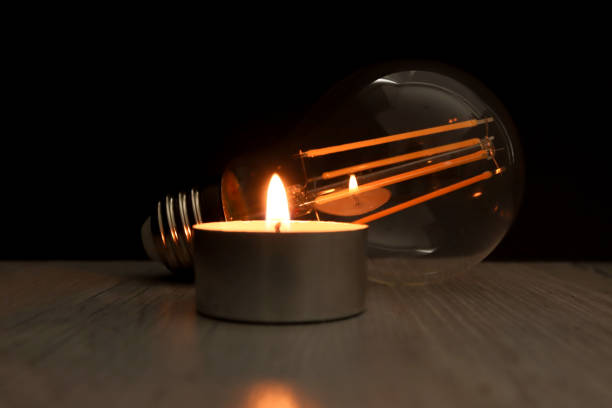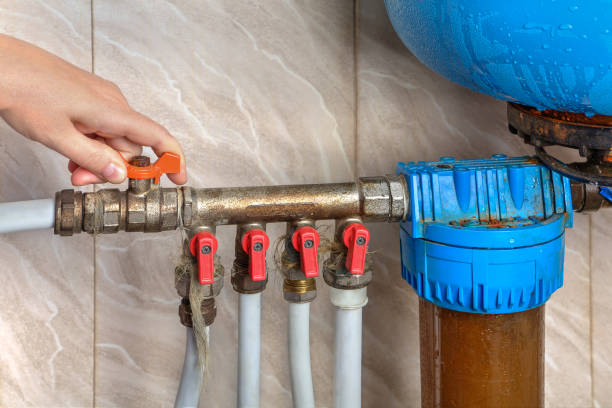A few safety tips can make a world of difference in the case of a power outage. These simple precautions will protect your family and property from hazards such as fire, electrocution and more.
Unplug unused appliances and electronic devices to reduce the risk of a voltage surge when the electricity comes back on. This will also prevent appliances from overworking as the power returns and potentially damaging them.

1. Turn Off Appliances
During a power outage, your first priority should be turning off appliances with motors that aren’t essential for home operation. Unplugging these appliances will prevent a surge of current from rushing through them once the power returns, which can damage or destroy them. It’s also a good idea to unplug your refrigerator and freezer to avoid food spoilage.
Use your flashlights to illuminate larger areas of the house, and try to avoid lighting candles. Candles create a fire hazard and don’t provide as much light as portable lanterns or battery-powered phone lights.
If you have an emergency radio, turn it on and listen for updates from the local news or the power company. It’s also a good idea keep the contact number for your power supplier handy so you can call them once the electricity is restored. Make sure to report the outage as soon as possible so they can begin working on it as quickly as possible. This will help to minimize the amount of time that you are without power and will give you an estimated time for when your lights should be back on.
2. Keep Your Furnace Running
Power outages can occur for a variety of reasons. Whether it’s a routine thunderstorm, an aging electricity grid, or a natural disaster, you need to be prepared to keep your home and family safe during any type of outage.
The first thing you should do during a power outage is to make sure everyone in your house has a way to stay warm or cool as needed, even without electricity. This may mean adding extra blankets to cold bedrooms or running a battery-operated fan in hot rooms. Using your phone to call loved ones and the electric company can also be important during a power outage. It’s best to have a back-up power solution, like a portable generator, in case of long-term outages.
If you have a gas furnace, it’s important to keep it turned off during a power outage. This will eliminate the possibility of carbon monoxide poisoning if you turn it on after the power returns and there is a problem with the system. Unplugging your furnace will also protect it from power fluctuations as they are restored.

3. Turn Off the Water
Ensure you turn off the water in your home before a power outage. This can prevent a water leak and keep the temperature of your home lower than usual. You can also contact your local water treatment plant to learn if you need to boil your water before using it again.
It’s important to unplug appliances before the power returns to avoid a sudden surge that can damage them. Then, when the lights come on again, they won’t be so sensitive to the change in electricity. Also, feel the outlets in your house and make sure they are cool to the touch before you plug anything back in.
If you are out of food or your refrigerator and freezer won’t stay cold, consider moving to the home of a family member or a community center where the heat or power may be working. You should always listen to your battery-operated radio for updates from local authorities regarding the status of a power outage in your area. Also, try to avoid using candles and kerosene lamps. These can be fire hazards if they are left burning or plugged in.
4. Move to a Cool Place
When the power goes out, it’s best to move to a cool place in your home. This can help keep your body temperature normal and prevent illness. Staying hydrated and drinking plenty of water will also help. Make sure to open windows that aren’t facing the sun and use a fan.
If you know that the outage will last more than a day, move refrigerated food to coolers packed with ice. The FDA says that food can be kept at 40 degrees or below for up to 48 hours in a refrigerator and up to 24 hours in a freezer.
Before turning on appliances after the power returns, be sure to check food items for an unusual odor, color or texture. Throw away any foods that have spoiled. Also, remember to check that medications that require refrigeration haven’t spoiled. If they have, contact your doctor for a new supply. A little preparation can save you a lot of stress during a power outage. Assemble an emergency kit in advance that includes a flashlight, battery-operated radio and extra batteries, bottled water, non-perishable foods, charged backup chargers for cell phones, medical supplies and blankets.
5. Call the Electric Company
One of the first things to do when the power goes out is to figure out what is going on and call an Electrician Plenty. This can help prevent panic and may even give you an idea about when you might expect the lights to come back on. Turn on your battery-operated radio or follow local news stations on social media for information and updates.
Remember, lighting candles is a fire hazard and should be avoided at all costs. Try to use flashlights instead. If you have children, elderly adults or someone with medical needs, make sure they know where to go if they need to leave their homes.
Rolling blackouts, big storms, equipment problems and downed trees can all cause an interruption in your electricity. Having a plan in place and being prepared is key to keeping you, your family and pets safe. Follow these safety tips from an electrician and get ready for the power to come back on soon.